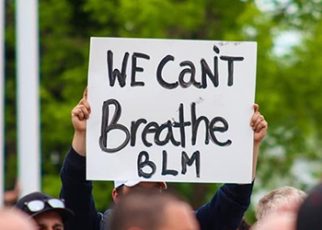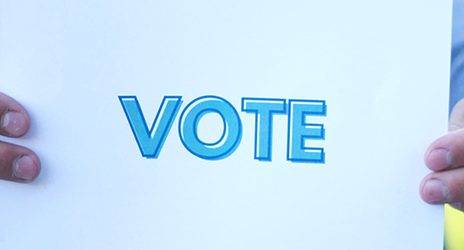By Danae Moksnes
In the wake of George Floyd’s and Breonna Taylor’s lives being lost due to police brutality, Minneapolis community members have made their presences known, showing their need to have justice served to the Black lives that have been lost. This movement made its name known in the Bemidji community, with Bemidji State students using their voices and keeping up a conversation on racial injustice.
In conversations with students at Bemidji State University, the students shared their experience in the height of the Black Lives Matter movement. The students’ involvement in the movement came in forms of peaceful protests in their town, and keeping discussions going on social media. Colbey Wadsworth shared that being open about topics surrounding racial injustice was somewhat new to him. “In the peak of things, it was weird because growing up this is the kind of stuff that you shrug off. But, I felt completely empowered enough to stand up for myself in every situation, and it was really awesome.”
Beatrice Kjelland also shared that the rise of this topic was new to her “I still find it a little difficult to talk about with the people around me. But I love to talk about it.”
Wadsworth has kept this up in conversations online, saying that he’s been “Posting things about what I’ve been doing, and then I’ll have somebody respond by throwing skewed stats and all that stuff.”
Zoe Christensen is the president of the Black Student Union at Bemidji State, and in sharing her experience, she said she took on the role of an educator by taking on the tough conversations, and using information she gained in studying her criminal justice major to assist in that role. “I’ve always had to be an educator. I’ll post on my instagram and Snapchat stories, and people will respond saying they don’t agree with it. Even though I want them to see my perspective, I always try to take a step back and get where they are coming from.”
On June 6, Bemidji State University’s Black Student Union organized a peaceful demonstration at Paul Bunyan Park. This demonstration was filled with students and Bemidji citizens, holding conversations about social injustice and taking a knee in respect for George Floyd. Bemidji State also posted pictures of the online flyer used to raise awareness of the demonstration on the university website. Christensen explained that this protest was “a really good learning experience for all of us, and it was also a way to bring our club into the community.” This demonstration was also covered in Bemidji’s Lakeland PBS News.
The students loved the turnout for the demonstration, and Christensen said how important the demonstration was for the community. “The Black Lives Matter movement as a whole is really important to every single individual, especially here at Bemidji State University where Black lives are extremely underrepresented.” Wadsworth shared the same pride for the demonstration, as he used his newfound empowerment to speak at the demonstration. “We got a lot of people driving by saying ‘All lives matter’ or ‘get a job’, but for every one person that did that, we had three or four people in support.”
The students of Bemidji are seeing the importance of speaking up for what they believe in. College students have taken their first step out into adulthood and are experiencing the world as their own. Christensen said how being a student during this movement brings a different kind of perspective to this political climate, and shared why she wants more students to speak out on the topic.
“We all have BSU as a connection, we all have to work together. We’re colleagues now, we’re adults. No matter what your view is and no matter what my view is, at the end of the day when we’re put in a Zoom breakout room, both of our opinions matter right then and there, We have to help each other out. So on a broader scheme, why can’t you help me out with real life stuff, and not a five point assignment?”
More students and young adults are beginning to help out on a broader scheme, joining protests and keeping the topic trending on social sites like Instagram and Facebook. Many see the changes that they want to happen, and are beginning to advocate for those changes. Wadsworth was open that his advocacy is for “reform in the police department, if not abolishment”, explaining that “we can find better ways to police our streets. It’s either progress or keeping things the way it’s been.”
The students were open about the tough conversations they’ve had about the Black Lives Matter Movement and the common responses they have received. They have held many discussions with those that say “All Lives Matter” or that see this movement as a degradation of the police force. Christensen shared that her response to this is that “The only time someone says all lives matter is when someone says ‘Black lives matter.’ I’ll say, if all lives matter, then how come when Black people are victims of police brutality, you don’t speak out for them?”
Kjelland said that in her conversations, people have said that racism is dead, but she said it definitely isn’t. “There are hints of it all over the world. It’s in the way that people look at us when you go to the store. We get followed by the police a little more closely than our white peers and that’s not right. I’m scared when I get pulled over, there’s that fear that I wont be treated the same as a white person. People don’t notice those little things that seem little, but are a very scary reality for us.”
These students explained that the Black Lives Matter movement is not trying to take away the equality that exists, but to bring awareness to the equality that doesn’t.
Kjelland said “I don’t want people to think that their life doesn’t matter, because we know how it feels when our lives, opinions and voices don’t matter. Everybody does, but right now, it’s not the white lives that are at stake, or the white voices being ignored, it’s the black lives and voices. We want a voice, we want to be heard and seen. We want our lives and voices to be important like everyone else’s.”
Christensen brought up a commonly used phrase, which is “An Injustice for one is an Injustice for all”. This movement is looking for justice, and Christensen said “if you see someone being treated unfairly, regardless of race, religion,or wherever they’re from, why wouldn’t you try to stand up for them? It seems like the only difficulty now is when its Black Lives matter versus anything else. I feel like that’s where people have a problem sticking up for each other.”
“If students want to learn more and become a part of the movement, there are many resources out there,” Wadsworth said. “There’s a ton of documentaries to watch. There’s plenty of things to do that you can get involved with and learn more. Find Twitter threads, if you can get into the loop of current events, that’s great.”
Christensen said that an important part of the movement is staying informed on current events and policy changes. “As much as discrimination is still happening, there are plenty of people that are still pushing for a more equal and equitable world. I appreciate when people want to hear about stories I have as a person of color. I think that most people of color appreciate that as well.”




